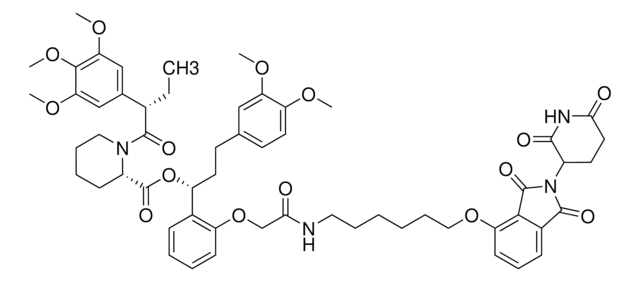E5156
Epinastine hydrochloride
≥98% (HPLC), solid
Synonym(s):
9,13b-Dihydro-1H-dibenz[cf]imidazo[1,5-a]azepine hydrochloride, WAL-801Cl
About This Item
Recommended Products
Quality Level
Assay
≥98% (HPLC)
form
solid
storage condition
desiccated
color
white
solubility
H2O: 38 mg/mL
originator
Boehringer Ingelheim
storage temp.
2-8°C
SMILES string
Cl[H].NC1=NCC2N1c3ccccc3Cc4ccccc24
InChI
1S/C16H15N3.ClH/c17-16-18-10-15-13-7-3-1-5-11(13)9-12-6-2-4-8-14(12)19(15)16;/h1-8,15H,9-10H2,(H2,17,18);1H
InChI key
VKXSGUIOOQPGAF-UHFFFAOYSA-N
Gene Information
human ... HRH1(3269)
Looking for similar products? Visit Product Comparison Guide
General description
Biochem/physiol Actions
Features and Benefits
Signal Word
Danger
Hazard Statements
Precautionary Statements
Hazard Classifications
Acute Tox. 3 Oral
Storage Class Code
6.1C - Combustible acute toxic Cat.3 / toxic compounds or compounds which causing chronic effects
WGK
WGK 3
Flash Point(F)
Not applicable
Flash Point(C)
Not applicable
Personal Protective Equipment
Certificates of Analysis (COA)
Search for Certificates of Analysis (COA) by entering the products Lot/Batch Number. Lot and Batch Numbers can be found on a product’s label following the words ‘Lot’ or ‘Batch’.
Already Own This Product?
Find documentation for the products that you have recently purchased in the Document Library.
Our team of scientists has experience in all areas of research including Life Science, Material Science, Chemical Synthesis, Chromatography, Analytical and many others.
Contact Technical Service







